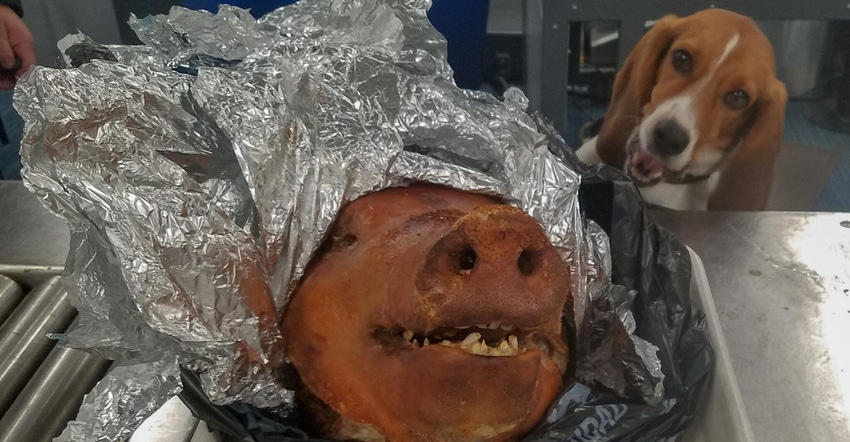Bill authorizes 600 new agricultural technicians and 60 new agricultural canine teams, but Congress will still need to appropriate funds.

On Wednesday, President Donald Trump signed into law The Protecting America’s Food & Agriculture Act of 2019, which addresses the shortage of agricultural inspectors who protect the nation’s food supply and agriculture industry and ensure safe and secure trade of agricultural goods across borders by authorizing U.S. Customs & Border Protection (CBP) to hire additional inspectors, support staff and K-9 teams to fully staff America’s airports, seaports and land ports of entry.
The U.S. Department of Agriculture and CBP work together to facilitate safe and secure importation of agricultural goods into the U.S. The program’s agricultural specialists and K-9 units conduct inspections of passengers, commercial vessels, trucks, aircraft and railcars at U.S. ports of entry to protect health and safety by preventing the entry of harmful goods and invasive species that may pose a threat to American food and agriculture. On a typical day, those inspectors process more than 1 million passengers and 78,000 truck, rail and sea containers carrying goods worth approximately $7.2 billion. According to CBP estimates, there is a shortage of nearly 700 inspectors across the country.
The act authorizes the annual hiring of 240 agricultural specialists a year until the workforce shortage is filled and 200 agricultural technicians a year to carry out administrative and support functions. The bill also authorizes the training and assignment of 20 new K-9 teams a year, which have proven valuable in detecting illicit fruits, vegetables and animal products that may have otherwise been missed in initial inspections. Finally, the bill authorizes supplemental appropriations each year to pay for the activities of the agriculture specialists, technicians and K-9 teams.
“Michigan’s valuable agricultural industry depends on the safe and secure flow of goods and people through our nation’s border crossings,” said Sen. Gary Peters (D., Mich.), who serves as ranking member of the Senate Homeland Security & Governmental Affairs Committee and was an original co-sponsor of the bill. “That secure travel is made possible by the hardworking border security professionals charged with safeguarding our state against diseases, pests and other threats that could devastate our farm economy and compromise the health and safety of millions of Americans. I’m grateful that my bipartisan bill has been signed into law, and I will continue working to secure our borders and protect Michigan farmers and producers.”
“I’m proud that our bipartisan bill is being signed into law to support the agricultural inspectors serving at our borders,” Senate Agriculture Committee chairman Pat Roberts (R., Kan.) said. “The safety and security of our nation’s agriculture and food supply is more important than ever, and I thank President Trump for swiftly signing this legislation into law.”
“Our farms and crops are under increasing threats from invasive pests and diseases,” said Sen. Debbie Stabenow, ranking member of the Senate Agriculture Committee and another co-sponsor of the bill. “I’m pleased we will now be able to hire more agricultural inspectors at our borders to protect farmers, consumers and the safety of our food supply.”
“This bipartisan legislation would help fill a critical gap at our country’s ports of entry. Agriculture specialists, technicians and canine teams root out, identify and stop invasive pests and other dangers to our nation’s farms and green spaces,” National Treasury Employees Union (NTEU) president Tony Reardon said. “NTEU strongly supports this bipartisan bill and thanks Sen. Peters and Sen. Roberts for taking action to increase the numbers of employees at our ports who serve as the last defense against the accidental or deliberate introduction into our country of pests and plants that do not belong here.”
National Pork Producers Council (NPPC) president David Herring, a hog farmer from Lillington, N.C., said NPPC looks forward to working with Congress on appropriations to make sure CBP is fully funded to ensure the benefits of S. 2107 are fully realized.
"Ensuring we have enough agricultural inspectors at our borders is critical to maintaining a healthy U.S. swine herd," Herring said. "The U.S. Department of Agriculture and the Bureau of Customs and Border Protection have done much to mitigate the risk to animal disease. Bolstered by this legislation, even more resources will be available to strengthen biosecurity at our borders. This is a victory for farmers, consumers and the American economy," he said.
About the Author(s)
You May Also Like





